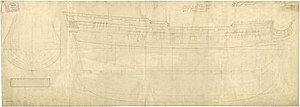HMS Harwich was a 50-gun fourth rate ship of the line of the Royal Navy, built at King's Yard in Harwich by John Barnard to the dimensions laid down in the 1741 proposals of the 1719 Establishment at Harwich, and launched on 22 December 1743.[1]
 Harwich
| |
| History | |
|---|---|
| Name | HMS Harwich |
| Ordered | 6 August 1742 |
| Builder | |
| Launched | 22 December 1743 |
| Fate | Wrecked, 1760 |
| General characteristics [1] | |
| Class and type | 1741 proposals 50-gun fourth rate ship of the line |
| Tons burthen | 976 (bm) |
| Length | 140 ft (42.7 m) (gundeck) |
| Beam | 40 ft (12.2 m) |
| Depth of hold | 17 ft 2+1⁄2 in (5.2 m) |
| Propulsion | Sails |
| Sail plan | Full-rigged ship |
| Armament | |
Her captain, William Adams, was killed in 1748 during Edward Boscawen's unsuccessful siege of Pondicherry during the War of the Austrian Succession.
At some point around in 1757 or shortly before, Harwich captured the Maria Louisa Magdalena, Messagere, and Comte de Maurepas. She shared the prize money, by agreement, with Torbay and Rochester.[2]
In 1758 she participated in the British Capture of Senegal, captained by Commodore Henry Marsh.[3]
Harwich was wrecked in 1760.[1]
Notes
edit- ^ a b c Lavery, Ships of the Line vol.1, p172.
- ^ "No. 9744". The London Gazette. 29 November 1757. p. 3.
- ^ "1758 - British expedition against Fort Louis in Senegal - Project Seven Years War". www.kronoskaf.com. Project Seven Years War. Retrieved 20 August 2021.
References
edit- Lavery, Brian (2003) The Ship of the Line – Volume 1: The development of the battlefleet 1650–1850. Conway Maritime Press. ISBN 0-85177-252-8.